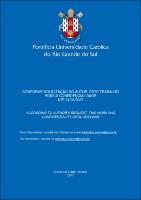| Share record |


|
Please use this identifier to cite or link to this item:
https://tede2.pucrs.br/tede2/handle/tede/7640| Document type: | Dissertação |
| Title: | Perfil de enfrentamento (COPING) e qualidade de vida dos pacientes em lista de espera de transplante renal |
| Author: | Siqueira, Diego Silveira |
| Advisor: | Figueiredo, Ana Elizabeth Prado Lima |
| Abstract (native): | Introdução: a doença renal crônica (DRC) é caracterizada por alterações estruturais ou da função dos rins presentes por mais de três meses com implicações para a saúde. Diante dessas alterações e complicações os pacientes sofrem ação de estressores capazes de influenciar no seu enfrentamento em relação à doença e perspectivas de tratamento. Objetivo: caracterizar o perfil de enfrentamento dos pacientes em lista de espera de transplante renal baseado na Escala de Jalowiec Coping Scale (ECJ) e avaliar a qualidade de vida SF-36. Método: trata-se de um estudo transversal de abordagem quantitativa desenvolvida na unidade de hemodiálise do Hospital São Lucas da PUCRS, em pacientes em lista de espera para transplante renal, com mais de 18 anos de idade e alfabetizados. Os dados foram coletados por meio de questionário com informações sócio demográficas sobre o paciente, ECJ e SF36. Resultados: foram incluídos 58 pacientes com prevalência do sexo masculino 51,7% (n=30), média de idade de 44,6 ±15,2 anos, 12,3% (n=7 ) acima de 65 anos e mais da metade da amostra, 57,9% (n=33) apresentou o ensino fundamental. Trinta e um (54,4%) pacientes eram casados (n=31); com um filho, 37,5% (n=21) e de religião católica 62,5% (n=35). Em relação à ECJ, o perfil predominante foi o Autoconfiante (0,455) e Otimista (0,404) 42 e 6 pacientes, respectivamente, sendo que 54 focados na emoção . As dimensões avaliadas com a melhor qualidade de vida foram: a dor (67,2), aspectos sociais (66,6) e saúde mental (65,4). Houve correlação significativa, fraca e negativa( r<0,333), entre o estilo paliativo e vitalidade (r=- 0,288; p=0,028) e paliativo e aspectos sociais (r=-0,283; p=0,031) . houve correlação significativa, negativa classificada como moderada entre o Estado Geral de Saúde e os estilos Emotivo (r=-0,424; p=0,025) e Paliativo (r=-0,524; p=0,004), bem como, entre a Vitalidade e o estilo Paliativo (r=-0,530; p=0,004). No sexo masculino, ocorreu resultado significativo, negativo com grau moderado (0,300<r≤0,600) na comparação da dimensão Dor com os estilos Confrontivo (r=-0,413; p=0,023) e Emotivo (r=-0,370; ;p=0,044). Conclusão: o perfil de enfrentamento dos pacientes em hemodiálise e em lista de espera de transplante renal, foi em sua maioria autoconfiante e otimista. Os melhores domínios na qualidade de de vida foram Dor, Aspectos sociais e Saúde mental, e os piores aspectos os físicos e os emocionais. |
| Abstract (english): | Introduction: chronic kidney disease (CKD) is characterized by structural changes or kidney function present for more than three months with health implications. Faced with these changes and complications, the patients undergo stressors capable of influencing their coping with the disease and treatment perspectives. Objective: to characterize the coping profile of patients on the waiting list for renal transplantation based on the Jalowiec Coping Scale (CJD) and to evaluate quality of life using SF-36. Method: a cross-sectional quantitative study that took place at the hemodialysis unit of Hospital São Lucas PUCRS, patients on the waiting list for renal transplantation, who are over 18 years of age and literate were included. Data was collected through a questionnaire with patient socio demographic information, CJD and SF36. Results: 58 patients were included, 51.7% (n = 30 males, mean age of 44.6 (± 15.2) years, 12.3% (n = 7) were above 65 years of age, more than half, 57.9% (n = 33) had elementary education. Thirty-one (54.4%) patients were married, (n = 31); 37.5% (n = 21) had one children and were of the catholic religion 62,5% (n = 35). In relation to CJD, the predominant profile was self - confident (0.455) and optimistic (0.404) 42 and 6 patients, respectively, of which 54 were focused on emotion. The dimensions evaluated with the best quality of life were: pain (67.2), social aspects (66.6) and mental health (65.4). There was a weak significant negative correlation, (r <0.333), between palliative style and vitality (r = -0.288, p = 0.028) and palliative and social aspects (r = -0.283; p = 0.031). There was a moderate negative correlation between general well being and emotive style (R = -0.424, p = 0.025) and palliative (r = -0.524, p = 0.004), as well as between Vitality and Palliative style (r = -0.530; P = 0.004). In males, there was a significant, negative moderate correlation result with a (0.300 <r≤0.600) beteween Pain dimension with the Confrontive style (r = -0.413; p = 0.023) and Emotive (r = -0.370). Conclusion: the coping profile of patients on hemodialysis and in waiting list for tranplant was mostly self-confident and optimistic. The best domains in the quality of life were Pain, Social Aspects and Mental Health, and the worst physical and emotional aspects. |
| Keywords: | Transplante renal Enfermagem Adaptação psicológica Estresse psicológico Diálise renal |
| CNPQ Knowledge Areas: | CIENCIAS DA SAUDE::MEDICINA |
| Language: | por |
| Country: | Brasil |
| Publisher: | Pontifícia Universidade Católica do Rio Grande do Sul |
| Institution Acronym: | PUCRS |
| Department: | Escola de Medicina |
| Program: | Programa de Pós-Graduação em Medicina e Ciências da Saúde |
| Access type: | Acesso Aberto |
| Fulltext access restriction: | Trabalho será publicado como artigo ou livro |
| Time to release fulltext: | 60 meses |
| Date to release fulltext: | 30/08/2022 |
| URI: | http://tede2.pucrs.br/tede2/handle/tede/7640 |
| Issue Date: | 20-Mar-2017 |
| Appears in Collections: | Programa de Pós-Graduação em Medicina e Ciências da Saúde |
Files in This Item:
| File | Description | Size | Format | |
|---|---|---|---|---|
| DIS_DIEGO_SILVEIRA_SIQUEIRA_CONFIDENCIAL.pdf | DIEGO_SILVEIRA_SIQUEIRA_DIS | 320.56 kB | Adobe PDF |  Download/Open Preview |
Items in DSpace are protected by copyright, with all rights reserved, unless otherwise indicated.




